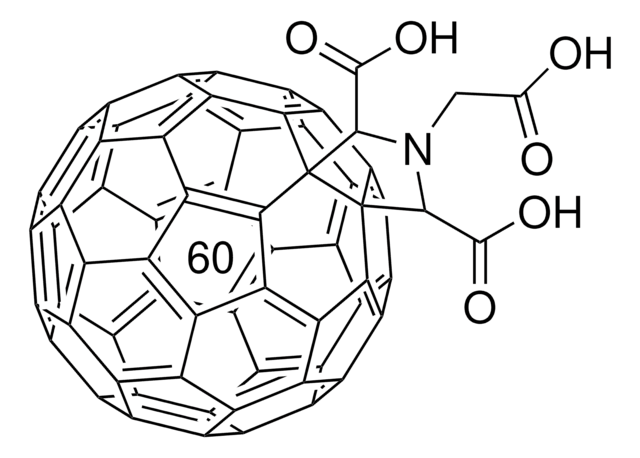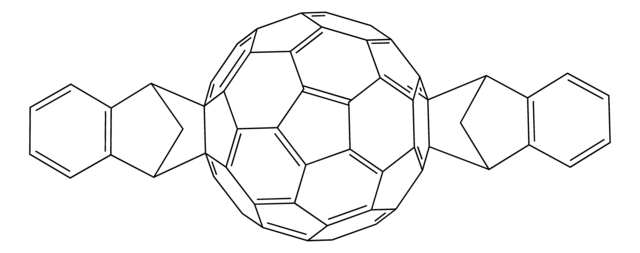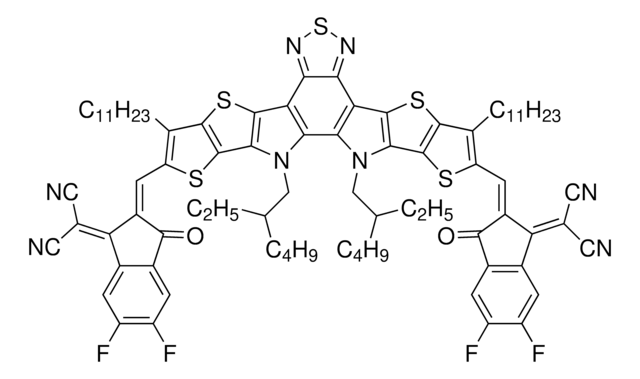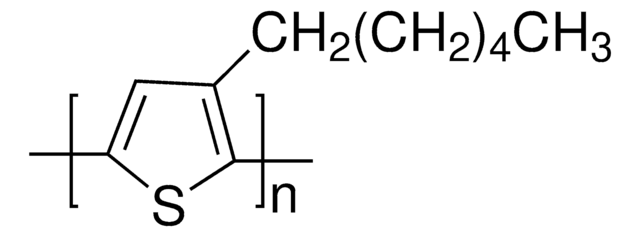684430
[6,6]-Phenyl C61 butyric acid methyl ester
>99%
Synonym(s):
1-[3-(Methoxycarbonyl)propyl]-1-phenyl-[6.6]C61, 3′H-Cyclopropa[1,9] [5,6]fullerene-C60-Ih-3′-butanoic acid 3′-phenyl methyl ester, PCBM, [60]PCBM
About This Item
Recommended Products
description
functionalized fullerene
Assay
>99%
form
powder
solubility
chlorobenzene: soluble
organic solvents: soluble
toluene: soluble
Orbital energy
HOMO 6.1 eV
LUMO 3.7 eV
semiconductor properties
N-type (mobility=0.21 cm2/V·s)
SMILES string
COC(=O)CCCC2(c1ccccc1)[C]3=4c5c6c7c8c9c%10c(c%11c%12c3c%13c5c%14c%15c6c%16c7c%17c9c%18c%19c%10c%20c%11c%21c%12c%22c%13c%23c%14c%24c%15c%25c%16c%26c%17c%18c%27c%28c%19c%20c%29c%21c%30c%22c%23c%31c%24c%32c%25c%26c%27c%33c%28c%29c%30c%31c%32%33)[C]2=48
InChI
1S/C72H14O2/c1-74-11(73)8-5-9-70(10-6-3-2-4-7-10)71-66-59-52-40-32-23-14-12-13-15-18(14)27-34(32)42-43-35(27)33-24(15)26-22-17(13)20-19-16(12)21-25(23)38(40)46-44-30(21)28(19)36-37-29(20)31(22)45-47-39(26)41(33)53-55(43)64(63(66)54(42)52)67-60(53)58(47)62-51(45)49(37)56-48(36)50(44)61(57(46)59)68(71)65(56)69(62)72(67,70)71/h2-4,6-7H,5,8-9H2,1H3
InChI key
MCEWYIDBDVPMES-UHFFFAOYSA-N
Looking for similar products? Visit Product Comparison Guide
General description
Application
Storage Class Code
11 - Combustible Solids
WGK
WGK 3
Flash Point(F)
Not applicable
Flash Point(C)
Not applicable
Personal Protective Equipment
Choose from one of the most recent versions:
Already Own This Product?
Find documentation for the products that you have recently purchased in the Document Library.
Customers Also Viewed
Articles
Since the first publication in 1995 describing a bulk heterojunction photodiode incorporating a methanofullerene, significant progress has been made in improving device performance and the scope of device research has broadened widely.
The field of organic electronics has emerged as the next-generation technology potentially enabling ultra-thin, large-area, and/or flexible devices, consisting of organic field-effect transistors (OFETs), organic light-emitting diodes (OLEDs), and organic photovoltaics (OPVs).
Find various photovoltaic and bioscience-based applications of fullerenes.
Professor Shinar (Iowa State University, USA) summarizes the developments of a variety of sensor configurations based on organic and hybrid electronics, as low-cost, disposable, non-invasive, wearable bioelectronics for healthcare.
Our team of scientists has experience in all areas of research including Life Science, Material Science, Chemical Synthesis, Chromatography, Analytical and many others.
Contact Technical Service![[6,6]-Phenyl C61 butyric acid methyl ester ≥99%](/deepweb/assets/sigmaaldrich/product/structures/359/221/d990c746-0960-4c69-bf76-fe09b193824d/640/d990c746-0960-4c69-bf76-fe09b193824d.png)
![[6,6]-Phenyl C71 butyric acid methyl ester, mixture of isomers 99%](/deepweb/assets/sigmaaldrich/product/structures/716/624/9fb9f2f0-ae99-429f-8d3a-b12267976a4d/640/9fb9f2f0-ae99-429f-8d3a-b12267976a4d.png)






![4-(1′,5′-Dihydro-1′-methyl-2′H-[5,6]fullereno-C60-Ih-[1,9-c]pyrrol-2′-yl)benzoic acid](/deepweb/assets/sigmaaldrich/product/structures/417/736/540e4dd8-0c87-48e5-8307-3befb16498ba/640/540e4dd8-0c87-48e5-8307-3befb16498ba.png)

